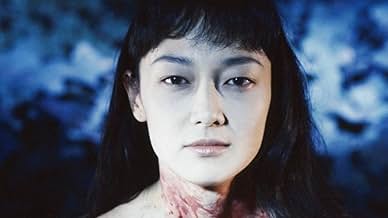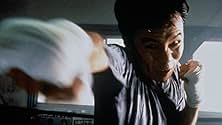IMDb-BEWERTUNG
7,0/10
4428
IHRE BEWERTUNG
Füge eine Handlung in deiner Sprache hinzuSuspecting that his childhood friend, a professional boxer, is having a love affair with his fiancée, a businessman starts training rigorously in order to take him down.Suspecting that his childhood friend, a professional boxer, is having a love affair with his fiancée, a businessman starts training rigorously in order to take him down.Suspecting that his childhood friend, a professional boxer, is having a love affair with his fiancée, a businessman starts training rigorously in order to take him down.
- Auszeichnungen
- 2 Gewinne & 2 Nominierungen insgesamt
Empfohlene Bewertungen
Tsukamoto in this film strips away excess to reveal a animal emotions which are then stretched to excess. In this film anger, violence, pain and revenge drive the action.
Tsuda and Kojima witness the murder of a girl they like and while both vow to find and punish the killers only Kojima holds on to the twisted dream to become a second rate boxer. Tsuda becomes a salaryman in a sexless relationship in which they spend the evenings watching old films (I spotted Metropolis and another which I can't place). A chance meeting between the two after many years awakens the anger that Kojima feels towards Tsuda, and the former begins making a play for Hizuru, Tsuda's girlfriend. This in turn leads Tsuda to become angry and he turns to boxing to get revenge on his former friend. Meanwhile Hikuru becomes a masochist, autonomous of both the males.
The fairly graphic violence is mostly make up and is so over the top it is clearly to make the point mentioned in one of the other comments: violence is often the first recourse in a situation. However, as opposed to a film like Rocky where the violence leads to personal redemption, or an emotional force like Raging Bull, the violence is non-cathartic and meaningless. It is almost as if the characters are driven to behave in a certain way as a reflex reaction.
Fast editing, powerful sound effects and blue colours mark the film out as Tsukamoto's style, and the transformation theme is another element that he returns to. Lots of fun for me, but the person I was with didn't have a clue what was going on. Make your own decision, but there is no relationship to Fight Club whatsoever: this is about human emotion, not social issues.
Tsuda and Kojima witness the murder of a girl they like and while both vow to find and punish the killers only Kojima holds on to the twisted dream to become a second rate boxer. Tsuda becomes a salaryman in a sexless relationship in which they spend the evenings watching old films (I spotted Metropolis and another which I can't place). A chance meeting between the two after many years awakens the anger that Kojima feels towards Tsuda, and the former begins making a play for Hizuru, Tsuda's girlfriend. This in turn leads Tsuda to become angry and he turns to boxing to get revenge on his former friend. Meanwhile Hikuru becomes a masochist, autonomous of both the males.
The fairly graphic violence is mostly make up and is so over the top it is clearly to make the point mentioned in one of the other comments: violence is often the first recourse in a situation. However, as opposed to a film like Rocky where the violence leads to personal redemption, or an emotional force like Raging Bull, the violence is non-cathartic and meaningless. It is almost as if the characters are driven to behave in a certain way as a reflex reaction.
Fast editing, powerful sound effects and blue colours mark the film out as Tsukamoto's style, and the transformation theme is another element that he returns to. Lots of fun for me, but the person I was with didn't have a clue what was going on. Make your own decision, but there is no relationship to Fight Club whatsoever: this is about human emotion, not social issues.
10theorbys
I've seen Tsukamoto's Tetsuo films but here he has found a way to be almost as outre but infinitely more accessible and coherent. The film is about 3 people (two men and a woman caught in a triangle) whose lives suddenly become charged with transformative psychosexual and psychoviolent energies revolving around the world of Japanese boxing (but it is nothing like a 'fight' film). Actor/Editor/Cinematographer/Director Tsukamoto has found a way to give a high impact, extremely rhythmic (in both time and space) look and feel to his ideas that is very original and striking. The spatial rhythm of the lead characters boring ordinary 'day' life passed in high rise apartment complexes and the incredibly kinetic temporal rhythm of his alternate 'night' life provides a terrific cinematic contrast of these two worlds. The film is rather short and gains immensely thereby in both concentration and focus. I, too, thought about Raging Bull at times but probably Tsukamoto is more akin to David Cronenberg (the new flesh) in his concerns, not his approach, than Scorsese. It may not be for the squeamish, but it is strong, brilliant film making which you should definitely try.
I watched this film on DVD for a second time tonight and I am sitting here struggling to comprehend the underlying meaning. I guess that begs the question as to whether there actually is one! Well, according to the director he wants to express the irrational. But is this irrationality based on some real underlying disturbance? I personally saw reflections of a number of underlying themes and I am wondering whether anybody else felt the same way. It seemed to me in particular that there was an element of repressed anger and violence in the Japanese society, as is so evident in Japanese anime (especially the 'hentai' variety). It certainly was a powerful film and the self destructiveness and brooding anger of the three central characters was certainly frightening yet moving at the same time.
I still wonder what the ending meant though, but I am tempted to interpret the parallel between the lead characters as an expression of some sort of common pent up repression of Japanese society. Let me know lest I start punching walls or succumb to the compulsion to have my head pounded :-)
I still wonder what the ending meant though, but I am tempted to interpret the parallel between the lead characters as an expression of some sort of common pent up repression of Japanese society. Let me know lest I start punching walls or succumb to the compulsion to have my head pounded :-)
The amazing movies of Shinya Tsukamoto are only a recent discovery for me, but boy, am I impressed! 'Tetsuo' remains an utterly unique and an unforgettable experience. 'Tetsuo 2' attempted to add conventional plot elements and character development to the originals more abstract experimentalism, and wasn't entirely successful in my opinion. However even that flawed follow-up wiped the floor with the brainless "action movies" Hollywood spews out year after year. 'Tokyo Fist', while not directly related to the 'Tetsuo' films, takes many of their elements, themes and hyperkinetic style, sets it in a more recognizable and relatively normal setting, and pulls off one of the most powerful and confronting movies you'll ever see.
The basic plot of a love triangle set against the background of explicit and life-altering violence cannot fail to remind the viewer of 'Fight Club'. In fact the parallels are so similar that one must wonder whether the creators of 'Fight Club' (novel or movie) are aware of this movie. To my mind 'Tokyo Fist' is a much more original, morally ambiguous and complex film than that overrated piece of MTV nihilism. Some people have questioned what the "real meaning" of this movie is. To me that speaks volumes regarding it's worth. No-one I'm sure would have to ask what 'Fight Club' is "really" about. It's so bloody obvious and spelled out for the audience. 'Tokyo Fist' is nowhere near as simplistic. It makes you THINK. Kudos to Tsukamoto for creating such an interesting and extreme cinematic experience!
The basic plot of a love triangle set against the background of explicit and life-altering violence cannot fail to remind the viewer of 'Fight Club'. In fact the parallels are so similar that one must wonder whether the creators of 'Fight Club' (novel or movie) are aware of this movie. To my mind 'Tokyo Fist' is a much more original, morally ambiguous and complex film than that overrated piece of MTV nihilism. Some people have questioned what the "real meaning" of this movie is. To me that speaks volumes regarding it's worth. No-one I'm sure would have to ask what 'Fight Club' is "really" about. It's so bloody obvious and spelled out for the audience. 'Tokyo Fist' is nowhere near as simplistic. It makes you THINK. Kudos to Tsukamoto for creating such an interesting and extreme cinematic experience!
The first ten minutes are awesome. The movie is very strong, but the quality varies a lot along its development until its bad end. Both the fast paced training scenes and the oppressive Tokyo city footage are very nice. Though, the bizarreness of the story bores. This is a live action film with an anime aesthetics (for anime fans perhaps the movie pleases more). It could be a great movie if it had developed better the main character's ordinary life as a white collar, the chaos of the city (the story does not explore the interesting way the town is shown), the dangerous boxer who tattooes the number of defeated challengers on his shoulder. Less emphasis in body horror and sneezing blood would also contribute to a more satisfactory outcome. The director's brother should be substituted by a better actor. A different and better story for the love triangle would be necessary too. To conclude, the director/writer/actor Shin'ya Tsukamoto has the skills, but lacks good taste and makes bad decisions.
Wusstest du schon
- VerbindungenFeatures Metropolis (1927)
Top-Auswahl
Melde dich zum Bewerten an und greife auf die Watchlist für personalisierte Empfehlungen zu.
- How long is Tokyo Fist?Powered by Alexa
Details
Zu dieser Seite beitragen
Bearbeitung vorschlagen oder fehlenden Inhalt hinzufügen
















